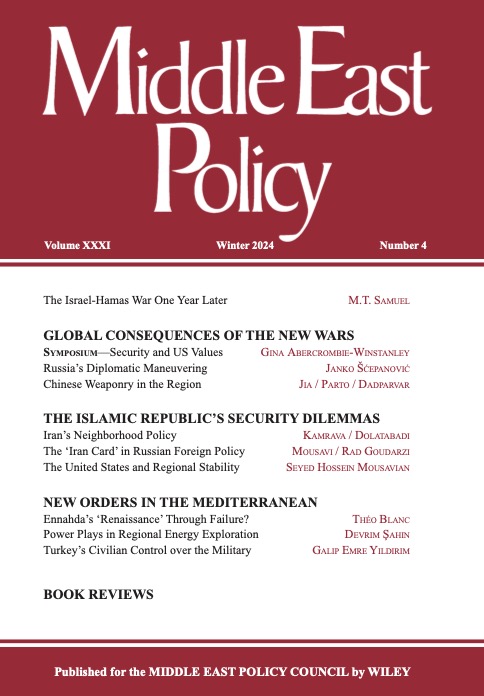Full-text analyses and book reviews covering issues from conflict and alliances to great-power influence and democratic processes are available to everyone, even without subscription, until February 15.
The Winter 2024 issue of Middle East Policy, investigating the post-October 7 conflicts, Iran’s regional influence, and governance and energy exploration in the Mediterranean, is now available for free to all readers, even those without a subscription! The journal, in its fifth decade, provides credible, comprehensive analyses to policy makers, scholars, and the public, combating disinformation through high-quality scholarship.
The journal’s 162nd installment examines Palestinian dispossession in the occupied territories, as well as security challenges and US values, the diplomatic maneuvering between Russia and Israel, and how Chinese weaponry is ending up on battlefields across the region. And we dig deeply into the case of Iran, including how the Islamic Republic cultivated support among neighboring countries, how Russia has exploited its relationship with Tehran, and how shifts in US policy can reduce tensions in the Gulf.
From there, the winter issue checks in on governance and security in the eastern Mediterranean. How will the Tunisian opposition move forward as strongman Kais Saied consolidates power after his 2021 coup? How has the decline of US-Turkey diplomacy affected cooperation on energy development and distribution? And how did key shifts in civil-military relations allow Turkey to improve its internal and external relations?
The Winter 2024 edition of Middle East Policy, featuring 10 original articles and three book reviews, is available through February 15 without charge. The journal’s compilation on the first year of the post-October 7 conflicts, Israel’s Wars, continues to be available for free for all readers.
Middle East Policy is consistently rated among the top publications covering Middle Eastern & Islamic studies. Since 1982, the quarterly journal has provided policymakers and the public with credible, comprehensive analyses of political, economic, and cultural issues pertaining to US-Middle East relations. We combat disinformation by publishing high-quality research by top scholars and public officials.
Here’s a look at the articles in the issue:
The Israel-Hamas War One Year Later: Mass Violence and Palestinian Dispossession
M.T. Samuel
GLOBAL CONSEQUENCES OF THE NEW WARS
Security Challenges and US Values in the Middle East
Gina Abercrombie-Winstanley
Russia’s Diplomatic Maneuvering in the Israel-Palestine War
Janko Šćepanović
Chinese Weaponry in Contemporary Middle Eastern Conflicts
Yingliang Jia, Amin Parto, Shabnam Dadparvar
THE ISLAMIC REPUBLIC’S SECURITY DILEMMAS
Iran’s Neighborhood Policy: Parameters, Objectives, and Obstacles
Mehran Kamrava and Ali Bagheri Dolatabadi
The ‘Iran Card’ in Russian Foreign Policy
Hamed Mousavi and Arteman Rad Goudarzi
The US Strategic Shifts Necessary for Stability in the Middle East
Seyed Hossein Mousavian
NEW ORDERS IN THE MEDITERRANEAN
In the Tunisian Opposition (Again): Ennahda’s ‘Renaissance’ Through Failure?
Théo Blanc
Power Plays in the Eastern Mediterranean and the Decline of US-Turkey Relations
Devrim Şahin
The Coup, the Pandemic, and Turkey’s Civilian Control over the Military
Galip Emre Yıldırım
REVIEWS
Erdoğan and the Demise of the Secular Republic
Hakan Yavuz
Yemen in the Shadow of Transition by Stacey Philbrick Yadav
Betul Dogan-Akkas
The Gates of Gaza by Amir Tibon
A.R. Joyce
